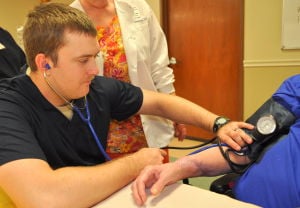The role of a Nurse is one of dedication and service, and for some, that calling extends to military service. Nurses in the military not only provide critical care to service members but also to civilians in crisis situations around the world. Serving as a Nurse in the military offers unique opportunities, excellent benefits, and a chance to be part of something greater than oneself. This article will explore Nursing opportunities across different branches of the U.S. military, focusing on the advantages and experiences military Nursing can offer.
Benefits of Being a Military Nurse
Military Nursing provides both personal and professional benefits, making it an appealing career path. Here are some of the standout benefits:
Financial Support for Education: The military offers scholarships, loan repayment programs, and sign-on bonuses to help cover the cost of Nursing school or further training. For example, the Health Professions Scholarship Program (HPSP) can cover full tuition for qualifying Nurses, in addition to providing a stipend.
Competitive Salary and Benefits: Military Nurses receive a competitive salary with the possibility of additional allowances for housing, food, and deployment. They also have access to healthcare and retirement benefits, which can offer a strong financial foundation compared to civilian roles.
Opportunities for Advancement: Each branch of the military provides clear pathways for career advancement. Nurses can move up in rank and expand their scope of responsibilities, such as overseeing teams or specializing in areas like anesthesia, trauma, or psychiatric Nursing.
Travel and Unique Assignments: Military Nurses have opportunities to work around the world, from military bases in the United States to international peacekeeping missions. Deployments offer chances to provide care in unique, high-impact settings, which can be incredibly fulfilling.
Specialized Training and Skill Development: Training emphasizes emergency response, trauma, and critical care, enhancing skills that are invaluable in both military and civilian settings.
Strong Community and Support Network: Being a part of the military community means joining a tight-knit network of individuals committed to service. The camaraderie and support that military personnel experience can lead to lifelong friendships and a strong sense of purpose.
Nursing Opportunities in Each Military Branch
Each branch of the U.S. military has its own unique culture and focus, offering different Nursing roles depending on its mission. Let’s take a closer look at the roles available in each branch:
Army Nurse Corps
The Army Nurse Corps is the largest and one of the most well-established branches for military Nursing. Army Nurses can work in a variety of settings, from field hospitals to medical centers on Army bases. Specializations include critical care, emergency trauma, surgical Nursing, and Nurse Anesthetist roles. The Army also has a Reserve component, allowing Nurses to serve part-time while maintaining a civilian career.
- Notable Opportunity: Army Critical Care Nurse (66S) and Army Nurse Anesthetist (CRNA) programs are highly specialized and offer hands-on experience in managing trauma in combat zones.
Navy Nurse Corps
Navy Nurses work in a wide range of environments, from naval hospitals on shore to hospital ships deployed for humanitarian missions. Navy Nurses may also serve with Marine Corps units since the Navy provides medical support to the Marines. Specializations include critical care, perioperative, mental health, and pediatrics.
- Notable Opportunity: The Navy’s hospital ships, such as the USNS Comfort and USNS Mercy, provide disaster relief and humanitarian aid globally, allowing Nurses to serve in non-combat missions that benefit civilian populations in crisis.
Air Force Nurse Corps
The Air Force Nurse Corps focuses on delivering care in both clinical settings on base and during aeromedical evacuations. Air Force Nurses may specialize in flight Nursing, which involves caring for patients being transported by air, often in critical condition. Nurses also work in medical facilities that support Air Force personnel and their families.
- Notable Opportunity: The Air Force’s Critical Care Air Transport Team (CCATT) program allows Nurses to work in aeromedical evacuation units, providing care in-flight and stabilizing patients en route to advanced treatment facilities.
Public Health Service Commissioned Corps
The U.S. Public Health Service (USPHS) Commissioned Corps is a uniformed service that addresses public health crises and responds to natural disasters and disease outbreaks. Nurses in the USPHS serve on the front lines of public health and preventive care and may work in federal hospitals, research institutions, and public health agencies.
- Notable Opportunity: USPHS Nurses are often deployed during public health emergencies, making it a rewarding path for those passionate about public health and disaster response.
Coast Guard Nursing Opportunities
While the Coast Guard does not have a formal Nursing corps, it collaborates with the U.S. Public Health Service to provide healthcare to Coast Guard personnel and their families. Nurses in the Coast Guard context often focus on occupational health, preventive care, and emergency response.
- Notable Opportunity: Nurses who wish to work closely with the Coast Guard may consider joining the USPHS, which offers assignments to Coast Guard clinics and medical facilities.
Military Nursing is a rewarding and challenging path that combines the compassion of Nursing with the sense of duty and adventure that comes with serving in the armed forces. Each branch offers unique opportunities, and while the commitment to serving as a military Nurse is significant, the benefits—educational support, competitive pay, advancement potential, and the chance to make a difference worldwide—make it a compelling choice. For those called to serve, military Nursing can be the adventure of a lifetime and a profound way to contribute to both the healthcare profession and national service.
Whether your interest lies in trauma care, public health, or disaster response, military Nursing has a place for you.


 Sgt. Angela Hughes was always interested in nursing, but wasn’t up to the role right out of high school.
Sgt. Angela Hughes was always interested in nursing, but wasn’t up to the role right out of high school. After much anticipation across the nation,
After much anticipation across the nation,